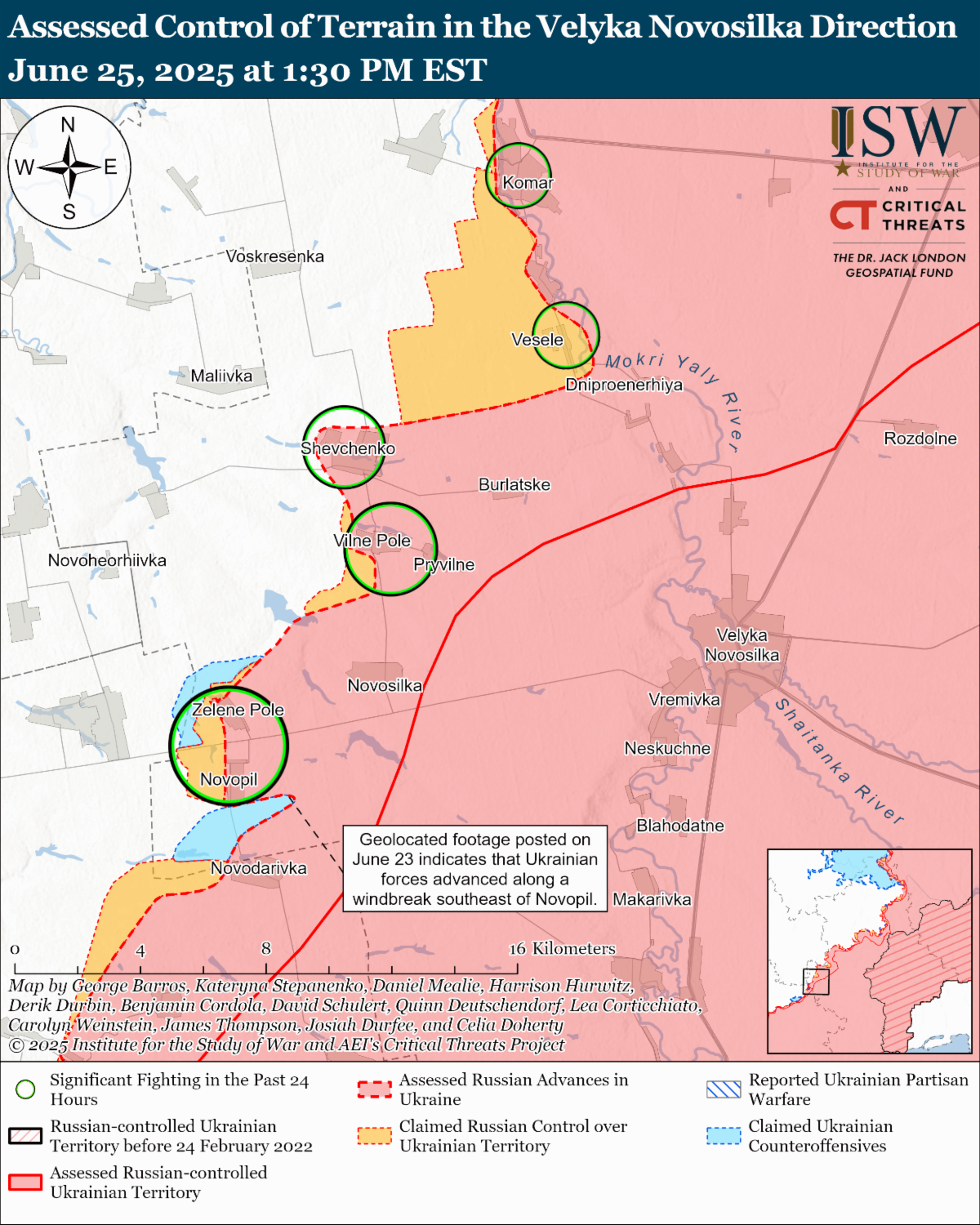US President Donald Trump stated that Russia may have territorial ambitions beyond Ukraine — consistent with ISW's long-held assessments that Russia is preparing for a future conflict with NATO and setting conditions to justify future aggression against non-NATO former Soviet Union states. A reporter asked Trump during a press conference at the NATO summit on June 25 whether it is possible that Russian President Vladimir Putin has territorial ambitions beyond Ukraine, and Trump responded that "it's possible." ISW has long assessed that Russia is preparing its military and society for a possible future conflict with NATO following the conclusion of the war in Ukraine, including by pursuing military reforms; integrating veterans into all levels of Russian local, regional, and federal governments; and setting rhetorical conditions to justify future aggression against NATO. ISW has observed the Kremlin leverage the same rhetoric that it used against Ukraine before the start of the full-scale invasion in February 2022 to threaten NATO states. The Kremlin has also specifically weaponized the concept of "compatriots abroad" — Russian-speaking populations living outside of Russia, whom Russia claims it needs to protect—to justify aggression against former Soviet states in the past. The Kremlin has also promoted its concept of "Russkiy Mir" ("Russian World") — an amorphous ideological and geographic conception that includes all of the former territories of Kyivan Rus, the Kingdom of Muscovy, the Russian Empire, the Soviet Union, and the contemporary Russian Federation and which Putin uses to frame any territories a Russian regime ruled or claimed to have ruled as Russia's "historical territories." The Kremlin has been setting informational conditions to justify potential aggression against Moldova and the Baltic states using the alleged need to protect its "compatriots abroad" and the claim that these countries are part of the "Russkiy Mir" — the same narratives that the Kremlin used to justify the full-scale invasion of Ukraine in February 2022. Trump's statements therefore, cohere with ISW's fundamental assessment that Russia maintains territorial ambitions beyond Ukraine and will continue pursuing these ambitions unless Putin is forced to reconsider his theory of victory.
US Secretary of State Marco Rubio correctly stated that Russia has not shown a willingness to move forward in peace negotiations. Rubio stated in an interview with Politico published on June 25 that Russia is trying to "achieve on the battlefield what [Russia is] demanding at the negotiating table" including "control over certain territories," but noted that this objective will be more difficult to achieve than Russia currently believes. Rubio stated that Russia has suffered over 80,000 killed-in-action (KIA) since January 2025 but that Putin nevertheless continues "feeding into the war machine" and that Russia has "not shown a willingness to move forward" in peace negotiations. Rubio's statements are consistent with ISW's assessments that Russia has been attempting to delay the negotiation process and protract the war in order to secure additional territorial gains. Russia's maximalist negotiating demands for Ukrainian territory, including significant amounts of territory that Russia does not currently occupy, represent an informational tactic intended to force territorial concessions to compensate for gains that Russia cannot achieve on the battlefield. ISW continues to assess that Russia is unwilling to engage in substantive negotiations to end the war in Ukraine in any way that falls short of acquiescing to Russia's maximalist demands, which have remained consistent since before the start of the full-scale invasion.
Key Takeaways:
- US President Donald Trump stated that Russia may have territorial ambitions beyond Ukraine – consistent with ISW's long-held assessments that Russia is preparing for a future conflict with NATO and setting conditions to justify future aggression against non-NATO former Soviet Union states.
- US Secretary of State Marco Rubio correctly stated that Russia has not shown a willingness to move forward in peace negotiations.
- The Kremlin continues to leverage Russian Security Council Deputy Chairperson Dmitry Medvedev's aggressive rhetoric to undermine Western support for Ukraine.
- Russian officials are promoting purposely vague rhetoric about the "root causes" of Russia's war against Ukraine in order to allow the Kremlin the flexibility to adapt its demands as it sees fit.
- Russia is reportedly accelerating its missile production capacity with sanctions evasion support from Belarus and the People's Republic of China (PRC).
- NATO and Western officials reaffirmed their commitment to collective defense and security, to increasing defense spending in the face of increased Russian aggression, and to providing support to Ukraine.
- Ukraine's European partners continue to allocate military aid to Ukraine and deepen cooperation with the Ukrainian defense industrial base (DIB).
- Ukrainian forces likely conducted a long-range strike against a Russian military industrial enterprise in Rostov Oblast on June 24.
- Ukrainian forces recently advanced near Borova and Velyka Novosilka, and Russian forces recently advanced in Vovchansk and near Pokrovsk and Novopavlivka.
| 




 [ISW] 러시아 점령 업데이트, 2025년 6월 23일
[ISW] 러시아 점령 업데이트, 2025년 6월 23일
 [국방부] '유연한 공감형 ESFP' VS '엄격한 관리자 ESTJ' 군인들...
[국방부] '유연한 공감형 ESFP' VS '엄격한 관리자 ESTJ' 군인들...